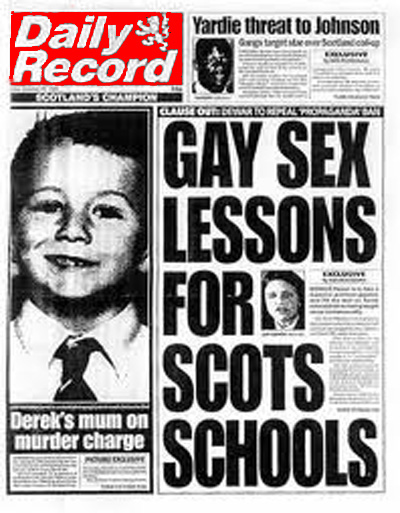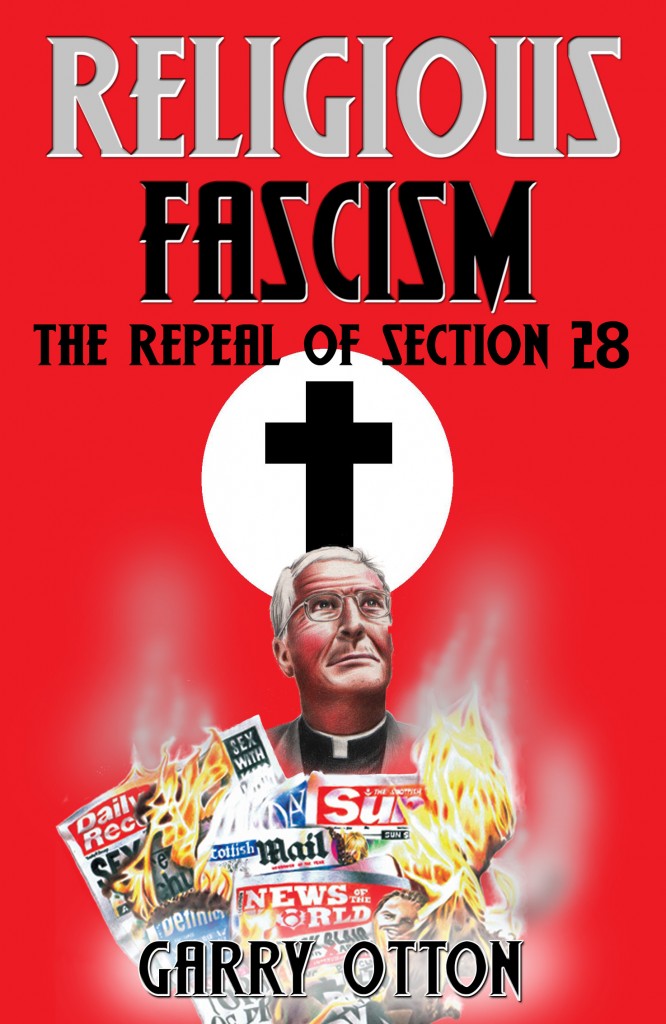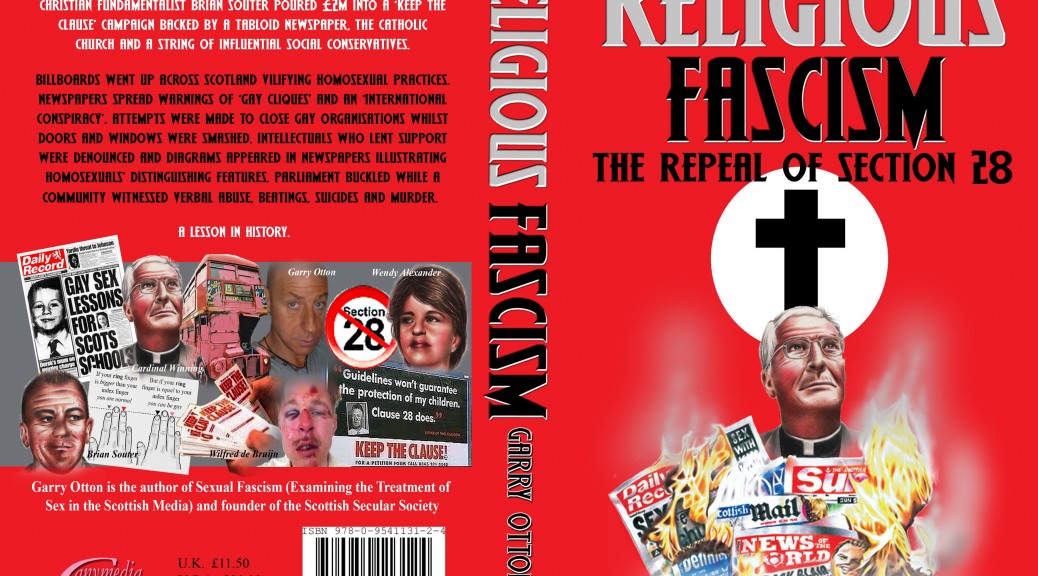![Pageflex Persona [document: PRS0000035_00047]](http://garryotton.com/wp-content/uploads/2014/04/ReligFascFrontandBackcover2.jpg)
The repeal of Section 28 was a forerunner to later terrorist acts attributed to religious extremism. The religious-backed campaign terrorised a community and threatened Scotland’s fledgling parliament.
Some will see the imposition of Section 28 – the law that forbade the “promotion” of homosexuality as a “pretended family relationship” – against a backdrop of Margaret Thatcher addressing a sea of waving Union Jacks at the Conservative Party Conference of 1987 following hot on the heels of exaggerated tabloid stories of black lesbian self-defence groups or books like ‘Jenny Lives with Eric and Martin’ in school libraries. (It was actually in a teachers’ resources library). When this Tory, anti-gay, religiously-inspired law was challenged in 2000: Scotland would be the main battleground.
In England and Wales, efforts to keep Section 28 on the statute books was, to a large extent, pointless since Section 28 applied not to schools but local authorities whose control many had opted out of under measures introduced by – of all people – former Tory leader Margaret Thatcher.
The Scots remember repeal as a time when the gay community was under attack from billboards mounted across every available space in Scotland vilifying homosexual practices. Intellectuals who wrote to newspapers to lend support were denounced. Newspapers spread warning of ‘cliques’ and rumours of an ‘international conspiracy’. Attempts were made to close LGBT organisations and doors and windows of such premises were smashed. Pictures could even be found in newspapers illustrating a homosexual’s distinguishing features. Parliament wavered and buckled while a community in crisis was left to defend itself against a rise in verbal abuse, beatings, suicides and murders. This wasn’t Germany in 1935: It was Scotland in 2000. It was sparked by MSP Wendy Alexander announcing the repeal of Section 28 and Christian fundamentalist Brian Souter pouring £2m into a ‘Keep the Clause’ campaign backed by Cardinal Winning of the Catholic Church and a string of influential social conservatives.
It began in 1999 when controversial American TV evangelist Pat Robertson, owner of a mammoth media, educational and legal empire in the USA with an estimated value of a billion dollars, was introduced to ultra-conservative Catholic Bill Hendry, the Bank of Scotland’s executive vice-president. The bank announced it was setting up a telebanking operation with Pat Robertson who once claimed that the “feminist agenda is not about equal rights for women: It is about a socialist, anti-family political movement that encourages women to leave their husbands, kill their children, practice witchcraft, destroy capitalism and become lesbians.” As Bank of Scotland share prices fell and clients started withdrawing their savings, the bank was forced to pull out. Robertson labelled Scotland a “dark place” over-run by homosexuals. The bank called on media boss and ex-Sun editor Jack Irvine to step in. During the equally contentious debate about an equal age of consent, Irvine was famous for referring to “pretty young boys of 16” who couldn’t vote being “mature enough to be bum chums for sleazy old pervs”. Scotland’s richest man, Stagecoach boss, Brian Souter, a Bank of Scotland customer and member of the hellfire and brimstone Church of Nazarene, was sufficiently inspired by Irvine to court him for an idea of his own. They shared a good lawyer. Jack Irvine’s business partner Peter Watson sometimes accompanied him on business trips to the Cayman Islands. He was the man behind legal firm Levy & McRae which legalled articles for the press. As Scotland’s top lawyer, Watson counted the Lord Advocate of Scotland, Elish Angionlini, an appointed member of the Scottish Government as one of his most prestigious clients.
Powerful figures backed the ‘Keep the Clause’ campaign. Not just Martin Clarke, the editor of Scotland’s top-selling tabloid the Daily Record, but also the editor of the Sun, Scotland on Sunday, the Daily Mail, the Telegraph and numerous other publications. Given the surfeit of Christian journalists and columnists in the media and both the Westminster and Scottish Executive, there was no shortage of allies to respond to this emerging Christian campaign.

Under the auspices of preventing the repeal of Clause 28, gays were made scapegoats for a war against “the siren voices of liberalism”, secularism and permissiveness. Education packs that either sought to counter bullying by creating a better understanding of gay people or sex education leaflets aimed specifically at gay people to encourage safer sex were put under scrutiny. All the while the media perniciously portrayed homosexuals as a sinister menace with inferences of a “homosexual lobby” seeking to prey on impressionable youth and further a selfish agenda. Homosexuals were maligned in a media campaign furnished by well-funded Christian charities and organisations – some collecting around £2 million in annual income – like the Christian Institute and Christian Action Research and Education (CARE). Scotland’s fledgling Parliament would twist and turn as one compromise after another was offered to placate the pious.
Pleas for equal treatment were contorted into demands for additional rights. A victim of the Soho gay pub bombing was denied compensation under the Criminal Injuries Compensation after sustaining injuries and losing his partner whilst the partner of a heterosexual couple won theirs. And then, when Martin Fitzpatrick who fought successfully against eviction from a house he shared with his partner after he died, former religious correspondent and Daily Record columnist Tom Brown wrote: “What worries me is that this will be taken as capitulation to the homosexual cause. …The signal to demand more”.
SNP MP Jim Sillars, writing in the Scottish Sun sneered at “test tube births on a scale of millions, with the sperm of homosexuals conveyed artificially to women’s ovaries, in order to give homosexuals full rights to have children. That test tube world is the only logical conclusion of the Tatchellite campaign of full and equal rights”.
Scotland on Sunday Catholic columnist Gerald Warner wrote that “homofascism” was “aggressively and shamelessly, the ideology of the parliament”, that “homosexual missionaries” were coming for the children and incited people to take to the streets in protest. He mocked the lisp of Labour MSP Wendy Alexander, the “Minithter for Communitieth” who fronted the campaign for repeal before suggesting she was “living testimony to the unwisdom of abolishing the ducking-stool”.
Any equal treatment of gays was fair game. Gerald Warner’s homophobia knew no bounds. On gay partnerships he scoffed: “There is a vote-winner for you. Possibly with the co-operation of sympathetic local authorities, provision could be made for the romantically-minded to hold their wedding at the public convenience where the happy couple first met”. Special pages of letters in newspapers against repeal frothed with homophobia like this one from John McBride of Shettleston who wrote in the Scottish Sun: “I don’t have any kids myself but if I did and anyone tried to teach them about homosexuality I’d probably end up assaulting the teacher”.
In the Metro, owned by the same publisher as the Daily Mail, nine out of 10 letter-writers in the London edition were found to share the same names or initials as those in the Scottish edition even though what they wrote was completely unrelated.
Cardinal Winning was soon declaring gay sex a ‘perversion’ and, on a trip to Malta, compared the gay lobby’s imagined distribution of material in schools to Nazi bombs during the second world war. Upon his return he was met with press reports of a serious attack on a young doctor outside an Edinburgh gay bar. Threats of suicide to the gay switchboard doubled.
When a string of professors and academics wrote to the press sharing their concerns, they were mocked by the ‘Keep the Clause’ camp. Journalists regularly attacked Labour politicians who supported repeal. People like Donald Dewar’s adviser Philip Chalmers was caught with “a lady who was not his wife – although she may have been somebody else’s” in the back seat of his car in a red-light area after the Record were tipped off by police. Donald Dewar’s chief of staff John Rafferty was also targeted when he exaggerated death threats to health minister Susan Deacon over her support for abortion. But the chief target was always Wendy Alexander, described in the Record as “bossy”, a “spinster”, and “five-foot-nothing” and showered by a host of other uncharitable and misogynistic remarks. They suggested she was “riding high in the Department of Frump” and gave her a makeover, superimposing her head onto the body of a woman curled up on a couch wearing a white trouser-suit with lilac-strapped shoes. Alan Cochrane in Scottish editions of the Daily Telegraph called her the “accident-prone and politically myopic Miss Alexander”. Channel Four awarded Wendy Alexander a trophy and the title Parliamentarian of the Year in Scotland. The press were delighted to report how she smashed it to pieces as she got out of a car at Heathrow Airport. The following year, Channel Four awarded it to Christian homophobe Baroness Young!
Most of the press accepted paid advertising of ‘Keep the Clause’ petitions to complete and send to the Government. Many were backed by articles or even marked to indicate exactly where to sign to keep Section 28. Churches soon followed urging their congregations to sign. A free mailing address was set up to collect the thousands of signed petitions. The Scottish Sun found “condoms – sent by gay rights activists fighting to scrap Clause 28” whilst the Record reported the delivery of old beds and refrigerators.

Brian Souter threatened to launch a private referendum. He castigated the Electoral Reform Society (ERS) for refusing to back it, so, using an old electoral register, he launched his own after accusing a ‘gay clique’ in the Labour administration of wrecking his plans. MP Jimmy Wray referred to a ‘gay mafia’ in the Scottish Sun and in the Scotsman he advised: “People didn’t vote Labour into power to allow the country to be run by a gay mafia. The public don’t want to know what homosexuals are doing. This is the trendy minority trying to dictate to the majority, and it won’t work”. Echoing the Nazi treatment of Jews in the thirties when there were references to powerful Jewish cliques influencing government and of Jewish trickery, the Scottish Sun referred to “gay dirty tricks”. The Record warned: “The Section 28 turmoil has gone from unsatisfactory to downright sinister. It is now clear that powerful factions are determined that the people of Scotland will not have their say”. This was also aimed at ERS member and gay Labour MP Stephen Twigg, The ERS were in fact concerned about the rise in violence toward gays being reported by the police. ‘Keep the Clause’ had already become a playground catchphrase and police set up a special surgery in Edinburgh.
The Daily Mail printed a double-page spread with an anatomical diagram of the human phalanges explaining: “Homosexual men have slightly shorter second fingers than straight men”. The Record also carried the information along with their homophobic content.
In a film review for American Beauty, the Daily Mail detailed how Hollywood was “demonising heterosexual life as part of a disturbing new pro-gay agenda… This held that heterosexuality was a curse to be denigrated and mocked wherever possible and that gays could never win the power they craved in society without undermining heterosexuals whenever possible”.
Three quarters of those surveyed by the Gay Police Association cited ‘belief of perpetrator’ as a prime motivator behind homophobic incidents. Their advertisement showing a Bible and a pool of blood with the words: “In the name of the Father” was censored by Advertising Standards Authority. Despite coming eighth in a list of campaigns receiving the most complaints, ‘Keep the Clause’ posters were never removed despite widespread defacements from protesters.
Outcast, a gay political website, was closed, according to the Internet Service Provider (ISP), “following a complaint”. A university lecturer was paid almost a quarter of a million pounds in damages and legal costs by the ISP Demon, owned by Scottish Telecom, in an out-of-court settlement over material carried on the site. Outcast was a respected and nationally distributed gay political magazine run by volunteers with a circulation of around 10,000. It boasted contributions from many people who were sympathetic to gay equality, The ISP NetBenefit wanted an assurance from a solicitor acting for Outcast that they would not print anything libellous. “Obviously, no solicitor can give a guarantee like that”, said editor Chris Morris who had previously taken Britain to the European court over its unequal age of consent law.
A Christian couple, backed by Christian legal representatives, sought to take Glasgow City Council to court for “promoting” homosexuality. They eventually withdrew but succeeded in persuading the Council to write to all council-funded LGBT groups warning them not to “promote” homosexuality. The media spun it as a victory.
As the campaign to repeal went nationwide there was a surge of violence and murders, particularly gay men, across the whole country like 50-year-old Alex Noble who met his fate after picking up an 18-year-old in Glasgow. Ethan, a sensitive 16-year-old who was being bullied in a Catholic comprehensive in the Highlands hung himself.
The fledgling Parliament shook and wobbled at every turn towards repeal. At first, Ministers said that the guidelines on sex education were adequate and would not be reviewed: then they were. Despite insisting there would be no replacement clause for Section 28: the Scottish Executive was soon tabling one. Ministers insisted the guidelines on sex education would not be made legally binding: then came a U-turn. The public were assured by Donald Dewar that there would be no inclusion of marriage in any guidelines, but with an amendment by Catholic MSP Michael McMahon, religious campaigners were soon trying their luck with that too.
That was nothing compared to the semantic contortions Scotland went through over sex education. Without a national curriculum as in England and Wales, Scotland had no need for statutory guidelines. There were no calls from teachers for statutory guidance on drugs or alcohol where teachers were trusted. Now there were calls for statutory guidelines on sex education. Minister for Children and Education Sam Galbraith emphasised that these were not ‘guidelines’, which would govern the contents of statutory legislation – always rebuffed as contrary to Scottish practice – but ‘guidance’ which govern the conduct of sex education in Scotland. The ‘guidance’ was to state that parents had to be consulted if sex education – appropriate to pupils’ ages – were given to their children and that they could even remove them from classes, (although such a right already existed).
Section 28 was eventually repealed and stories of schools invaded by ‘homosexual propaganda’ proved entirely false. The same couldn’t be said for religion which, if it didn’t already own the school, had their unelected representatives on all of Scotland’s education committees. If schoolchildren couldn’t be rounded up to visit churches, clerics were invited into the classroom to work with children in so-called non-denominational schools without parent’s knowledge, which happened at Kirktonholme Primary School in East Kilbride where extreme sect Church of Christ had been pushing creationist anti-science literature on children for eight years before they were rumbled and exposed in the Daily Record, albeit it under a new editor.

Garry Otton, 2014

